- Home
- Jane Smiley
Saddles & Secrets (An Ellen & Ned Book) Page 7
Saddles & Secrets (An Ellen & Ned Book) Read online
Page 7
I said, “What’s that?”
“An ocean liner. They crossed from New York City to France, stayed in Paris for a week, then crossed back in five days. My grandmother said it was the most luxurious thing she ever did, and even though they could barely afford it, she was always glad they did it.”
The thing about Melanie is that she just says things. She never sounds like she’s bragging. Since I always sound like I’m bragging, I don’t understand how she does it.
We went out to the playground. A bunch of girls were skipping rope, so we got into that line. Two of the teachers were twirling the rope, and each of us had to run in, jump five times, and run out—then six, then seven. By the time the bell rang, I was panting, but at least we didn’t have to do double Dutch, which I think is impossible, but Melanie probably likes it because she has been to Holland and, in fact, I decided, spent three weeks there wearing wooden shoes and doing ballet at the same time, and once I had imagined her doing lots of kicks and splits in wooden shoes, every time I saw the back of her head across the room, it made me smile.
On Tuesday after school, the phone rang, and when I picked it up, Abby said, “Hello. This is Abby Lovitt. May I please speak to Mrs. Leinsdorf?” Her voice was stiff and a little high, as if she were calling from my school, and I almost laughed, but instead, I said, “Certainly you may. I will get her.” As I was putting the phone down, I heard her giggle.
Mom left me with Joan Ariel, who was lying on her back on her changing table, playing with a toy. It was a ball that could spin inside a hoop, and she would hold it in her right hand, spin the ball with the left, and then pass it to her left hand and wave at the ball with her right. I did my best not to do it for her, but it was hard. I opened my ears as wide as they would go, but I couldn’t hear a thing. When Mom came back, she said, “Miss Ellen, you have been cordially invited to spend the night at the Lovitts’ place on Friday night. When Mrs. Lovitt drives Abby to the stables Saturday morning, she’ll take you for your lesson, and then somebody will pick you up after your lesson.”
I said, “Whoever doesn’t get a flat tire.”
She said, “Exactly.”
Joan Ariel tossed the toy over Mom’s head. Mom said, “How did I get two real characters out of two?”
“Luck?”
“Yup.” She kissed me on the forehead, then she kissed Joan Ariel on the cheek.
I said, “Were you always a good girl?”
“You’ll have to ask Grandma. I’m not saying.”
She put Joan Ariel against her shoulder, so I could make funny faces at her as they went down the stairs. Then I turned to go into my room and do my homework, but I went into Mom and Dad’s room instead.
The good thing about Mom and Dad’s room is that it is pretty big and has two sets of windows—one faces across the street and one faces the house next door, but since we live on a hill, it looks over that house and down the street. If the weather is really clear, you can just see a bit of the bay in the distance. The bad thing about their room is that they can’t see the garden or smell it. They have a big double bed with a patchwork quilt on it, lots of colors. My mom calls the pattern “rippling waves,” and we aren’t allowed to sit on the bed. She and Grandma made it before I was born, when they were in a quilting group at the church. On Mom’s side of the bed were two books, Dr. Spock and a thick book called Topaz. On Dad’s table was only one book, National Geographic Atlas of the World. I’d seen it over and over and never once looked at it. What I did was sit down on the floor by the window, cross my legs, and open it up. It’s heavy and big, much bigger than the social studies book, and the pages are shiny. The main thing is that a lot of the pages are mostly blue. The other thing is that when I finally found our town (not easy), it was very very small. It was so small that I pushed the atlas off my legs and stood up, then went to the window and looked down the street just to make sure that it was still there. And it was. Jane and Jimmy Murphy were walking down the street with Brian between them, and someone on a three-speed bicycle was coming up the street about as slow as a turtle, but he was leaning forward and panting. I sat back down and set the atlas on my knees again, but then Mom was in the room. She came around the bed and said, “What are you doing? Didn’t you hear me call you?”
I shook my head.
“Why…” But then she saw the atlas on my lap. She said, “We can take that downstairs and put it on the coffee table. It’s way too big for bedtime reading. Anyway, come set the table. I made spaghetti.” She zipped out the door because she doesn’t ever like to leave Joan Ariel alone, which is good for me, because I like to be alone as much as possible.
I left the atlas on the floor. After dinner, I took a book off my own shelf that I’d read three times, King of the Wind, and, this time telling Mom, I went upstairs and looked at the places that were in the book: Windsor, Ontario (near Toronto); Morocco; France; England. I turned the pages back and forth and tried to imagine those places, but what I really wanted to do, now that I had read about Sham again, was to see Ned. According to Abby, all Thoroughbreds, like Ned and Ben and Jack So Far, are descended from three Arab sires—the Darley Arabian, the Byerley Turk, and the Godolphin Arabian, who is Sham in the book.
* * *
—
Dad was home by the time I walked in the door from school on Friday, a little early, but good for me. I’d already packed my overnight bag three times, but I ran upstairs and packed it again while Dad sat at the kitchen table and ate the last of the ice cream. Soon we were on our way to Abby’s, and it was a little different from the way it usually is. Dad was wearing his suit, and he was quiet while I told him why his atlas was on the coffee table, and gave him a little list of all the maps I’d looked at since Tuesday and what I thought about them. I had been writing them down in alphabetical order, but I didn’t have to look at the list—once I write something down, I remember it. I think we’d just passed the airport (because I saw a plane gliding down out of the off-and-on clouds above us) when he said, “Jamaica. I would go there.”
Jamaica is an island over near Florida. I said, “Would you go there first or Oahu first?”
“I would flip a coin.”
I said, “Jamaica looks like a seal and Oahu looks like a hat.”
“Well, our peninsula looks like a big face with its mouth wide open, screaming.”
And it does. And we live on the top of its head, right under the brim of the clown hat.
Dad dropped me off and put my overnight bag on the porch, because we had to get right to work. He was smiling when he waved good-bye.
No one had to tell me that staying at Abby’s was going to teach me a lesson. And it did teach me some lessons:
1. It taught me that the horses, all the horses, really like you when you’re bringing them their hay. They nicker and even whinny, and they look at you like you are their best friend forever.
2. It taught me that walking around late in the day, when the sun is balancing on top of the ridge, and you can hear the birds calling in the trees, and you can see a hawk arcing through the sky with its wings wide, is much more pleasant than division problems.
3. It taught me that of course you have to watch out for the manure and not step in it, but it also has a pleasant, almost sweet odor.
4. It taught me that you can whistle while you work, like in Snow White, but you can also sing a song, and I did sing a song—“Lorena.” When you carry the hay and sing a song at the same time, you feel like you are dancing.
5. It taught me that when you come in from doing your work, dinner tastes really good, especially if it’s beef stew, which is what Abby’s dad likes to have on Friday nights.
6. It taught me that it isn’t bad to go to bed early. I stayed in Abby’s room, in her other bed, and before we went to sleep, we opened the window and looked at the horses in the pasture and the moon that was alm
ost full and the brighter stars, and we made ourselves very quiet so that we could hear the horses walking in the dry grass, and blowing out air, and even their tails swishing, and a squeal or two.
7. It taught me that if you listen to those noises and make up your mind that everything is fine out there, nothing to worry about, you can sleep like a log all night and wake up first thing and be set for more work.
Schooldays, Abby has to get up before dawn every morning, but we just rolled out of bed, put on our clothes and caps, and headed out the door without even brushing our teeth. The horses don’t care. They care about the hay, and they were wide awake, much more wide awake than we were. We had already put their hay in the wheelbarrow the night before. After we pushed (Abby pushed, I helped a little) the wheelbarrow to them and threw out the hay, we refilled the water buckets with a hose and then were careful to turn off the spigot, because all you have to do in Abby’s neighborhood is look at the hillsides, which are dry and gold, to know that water is very precious and you really can’t wait for the rainy season to begin. Nobody had stayed in the barn overnight, so there was no cleaning in there. Abby’s place is not like the stables, and other fancy barns, where the horses are in their stalls all day and all night, every day. That’s why Blue prefers Abby’s, and why wouldn’t he? As I was walking around, I was saying to myself, “Ned, you are crazy if you want to leave here and go there,” and yes, Ned did say, “I just want to go someplace new!” But when I looked over at him, he was busy eating his hay and it didn’t look like he had said a thing.
We were back in the house by 8:15 (I looked at my watch). Abby’s dad was sitting at the table and her mom was dishing scrambled eggs out of the frying pan (I hate scrambled eggs), but then I saw pancakes (which I love) and sausage and a plate of orange slices, and so, since I was hungry, I sat down ready to dive in, but Mr. Lovitt’s hand shot across the table and landed on my hand just as I was poking my fork into the first pancake. He gave me a no-no look, and then closed his eyes and said grace. I was really hungry, so it seemed to last forever, and I must have snorted or something, though I didn’t mean to, and after he said “Amen,” he said, “Saying thanks is good practice,” so I said, “Thanks!” And then he said, “Try saying it like you mean it.”
I thought of Melanie, who is the best thank-you sayer I know. I imitated her. I said, “Oh, thank you,” and then I smiled.
Good enough. We started eating.
But he wasn’t in a good mood, humming a sad song. He was totally quiet and his eyebrows were lower than I had ever seen them, and Abby’s mom was not in a good mood, either, I noticed, in spite of the pancakes. Abby looked from one to the other and back. I had no idea what was going on. We ate and ate, then cleared our plates, and I was really glad to go out to the barn and clean tack. Abby was sad, too, much quieter than she had been when we first got up, so I started talking and babbled on for a while about Melanie and Ruthie and how Ruthie was going to learn to do the splits and also to bend over frontward and put her head all the way between her knees (I saw a picture in a bookstore of someone doing that), but then I finally said, “Please tell me what’s going on.”
“My mom is going to an antiwar rally. Dad tried to talk her out of it, but she’s made up her mind.”
“How is Danny?” Her brother, Danny, is a soldier in Vietnam.
“Fine so far.”
“Would Danny be sad that your mom is going to an antiwar rally?”
“Danny always says you should do whatever you want to do, because he always does whatever he wants to do. Or he did. I don’t know if he does that in the army. I doubt it.”
We kept soaping.
We never talk about the war at my house. Mom is against it, Dad says you have to do what you have to do, Grandma says that it could be worse, look at the Second World War, and Grandpa says it is bad, but also it’s like a pressure valve that makes sure there isn’t a much bigger explosion. When we came out of the barn with the halters and lead ropes to go get Sissy and Gee Whiz, I saw Abby’s mom leave in their car. She waved out the window and drove off. Here is another lesson I learned about work—it takes your mind off stuff that is sad but that you can’t do anything about.
Sissy and Gee Whiz were, of course, in separate pastures—Gee Whiz was in the gelding pasture on the left side by the hill as you walk out, and Sissy was in the mare pasture on the right side. The mare pasture slopes down toward a creek that runs in the winter, the spring, and for a while in the summer. The fence is on the other side of the creek, so the mares get to go stand in the water when they feel like it, and when Abby and her dad get a new horse, they teach it to cross creeks by walking around in and out of the creek and across it until it is no big deal. Sissy was standing by her gate, but lucky for me, Gee Whiz was way in the back, so I went in with Abby and dawdled behind her, and sure enough, Ned came trotting over, and guess what? I did have a lump of sugar in my pocket that I’d found in the tack room, and as soon as he got to me, I gave it to him and patted his nose. He seemed in a good mood, and while I was following Abby, he followed me—not too close but as if he was on a lead rope. I would stop and he would stop, and I would start up again and he would start up again. I didn’t say anything to Abby, who was pretty far in front of me and finally whistled for Gee Whiz, and though he looked up, he didn’t come. I guess that Gee Whiz is a lot like Danny.
Here’s the thing about Abby—she’s very patient. Here’s the thing about Gee Whiz—he’s got his own ideas. He spent most of his life being a successful racehorse—not great or famous, but he won a lot and traveled to a lot of racetracks, and so you could say that, for a horse, he saw the world. Sometimes he comes running straight at Abby like he’s going to run her down, and then he stops dead about two feet in front of her and pricks his ears, and his face says, “Scared ya, didn’t I?” Once last winter he even came to a sliding stop like they do in baseball games. Didn’t touch her. Abby says that he knows where every part of his body is every moment and that’s why he never ever knocks a rail when he’s jumping. I suppose he figures that he’s got better things to do than go around the arena with Sissy.
All this time, Ned was standing beside me, just standing. A couple of times he looked over at Gee Whiz, a couple of times he looked up the hill, a couple of times he put his head down and found some herbs in the grass. He snorted away a fly and tossed his head. But the whole time, he seemed relaxed, and after a minute or two, I started to pet him. Horses have all different kinds of coats, and Ned has a silky one, so you start petting him and then you don’t want to stop. I tickled around his eyes and stroked the side of his face, but then I just started running my hands down his neck, over his shoulder, along his back and side. He dropped his head and half closed his eyes. His ears flopped. I kept doing it, then went around and started on the other side. In the meantime, Gee Whiz had walked even farther away, and I saw Abby go to the gate and let herself out. Now I closed my eyes a little, and after I stopped looking at Ned, I started feeling him—how warm he was, how big he was, the ripple of his muscles. I do not know how long this went on, but suddenly, Abby was saying, “Are you asleep?” I opened my eyes. There she was with Gee Whiz all haltered up and on the lead rope—and with that “Who, me?” look on his face like the boys in my class get when the teacher suddenly whips around and stares at them. Ned backed off.
But then he followed me as I followed Abby and Gee Whiz to the gate, and when we got there, he came closer, and I did give him another lump of sugar that I seemed to have found in my pocket. He stood there until I had Sissy, and then wandered away.
Can a horse be your friend? Books say yes, Abby’s dad says no. Sissy, I’m sure, says, “I doubt it.” As soon as I got on her, I could feel that I would need a crop to get her to make an effort. Why was that? It was a little warm but not hot. Was she stiff because she’d had a bad night? Was she tired or lazy or in season? Her ears were not pinned, but she kept putting them bac
k a little. Was she warning me or just saying something that I couldn’t quite understand? Abby saw me kick her a couple of times, took Gee Whiz over to one of the jump standards, got a crop, and brought it to me. I said, “What’s wrong with her?”
Abby said, “Lazy.”
“What if something hurts?”
“The more she moves, the less it’ll hurt.”
I took the crop, held it with the lash pointing upward rather than down, and Sissy woke up—she lengthened her walk, lifted her head. After a few steps, she went up into a trot, as if to say, “See? Please don’t smack me.” I didn’t. The more we worked, the more agreeable she got. And Gee Whiz, who hadn’t wanted to be caught, was perfect in every way—every transition was precise, every turn was elegant, every halt was square. Not a single toss of the head, not a single switch of the tail. And I could see that he was holding the bit in his mouth as if it were made of glass and he didn’t dare break it.
The “lesson” part of my lesson was short. Once we were all warmed up, Abby set some courses. She jumped them first, then Sissy and I jumped them, and it did seem as though Sissy learned from watching Gee Whiz. At least, her ears were pricked, she turned her head to see where he was going, and when we did our courses (Abby lowered the rails from 3'6" to 2'6"), they seemed easy. But then, I was watching, too, so maybe we both learned.
Afterward, when we were moseying up the trail (I like that word better than “sauntering” now), I asked if a horse could be your friend. Abby looked at me for a long time (and yes, Gee Whiz tossed his head), and she said, “I say yes, my dad says, ‘Not a good idea,’ because it’s a lot harder to sell a friend.”
“Is Gee Whiz your friend?”
She stroked him along the top of his mane, nodded, and said, “For now he is. But he’s an ex-racehorse who’s been around. So I think he considers me his co-worker.”

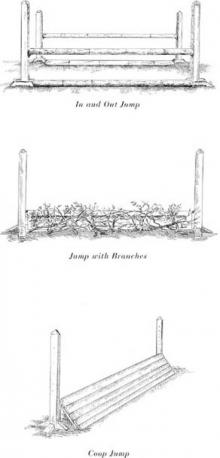 The Georges and the Jewels
The Georges and the Jewels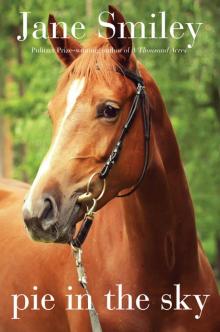 Pie in the Sky: Book Four of the Horses of Oak Valley Ranch
Pie in the Sky: Book Four of the Horses of Oak Valley Ranch Duplicate Keys
Duplicate Keys Charles Dickens
Charles Dickens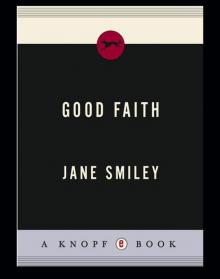 Good Faith
Good Faith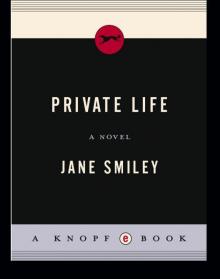 Private Life
Private Life A Thousand Acres: A Novel
A Thousand Acres: A Novel The Greenlanders
The Greenlanders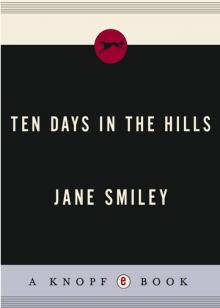 Ten Days in the Hills
Ten Days in the Hills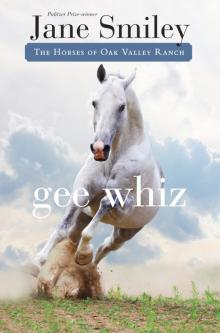 Gee Whiz: Book Five of the Horses of Oak Valley Ranch
Gee Whiz: Book Five of the Horses of Oak Valley Ranch A Thousand Acres
A Thousand Acres The All-True Travels and Adventures of Lidie Newton
The All-True Travels and Adventures of Lidie Newton Ordinary Love and Good Will
Ordinary Love and Good Will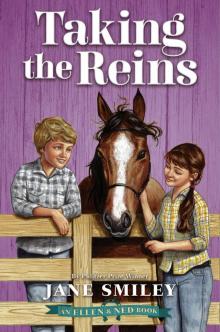 Taking the Reins (An Ellen & Ned Book)
Taking the Reins (An Ellen & Ned Book) The Man Who Invented the Computer
The Man Who Invented the Computer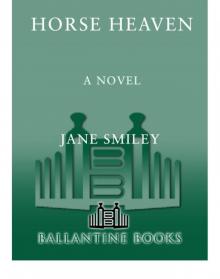 Horse Heaven
Horse Heaven The Age of Grief
The Age of Grief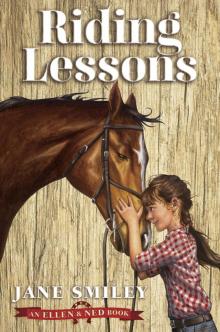 Riding Lessons
Riding Lessons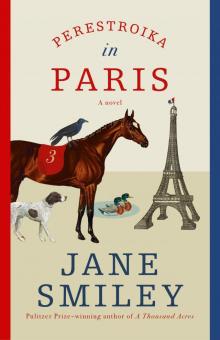 Perestroika in Paris
Perestroika in Paris A Good Horse: Book Two of the Horses of Oak Valley Ranch
A Good Horse: Book Two of the Horses of Oak Valley Ranch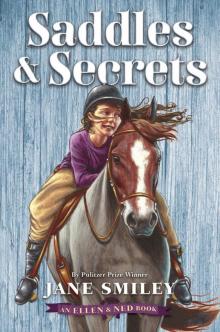 Saddles & Secrets (An Ellen & Ned Book)
Saddles & Secrets (An Ellen & Ned Book)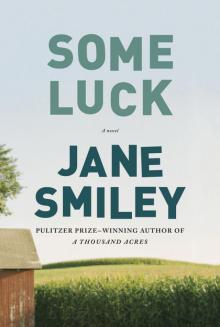 Some Luck: A Novel
Some Luck: A Novel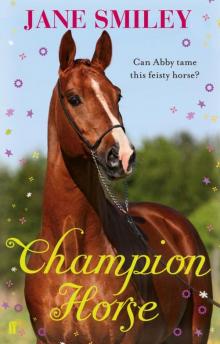 Champion Horse
Champion Horse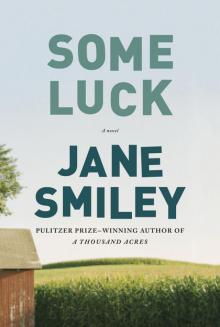 Some Luck
Some Luck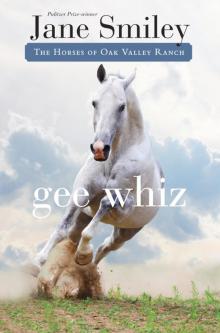 Gee Whiz
Gee Whiz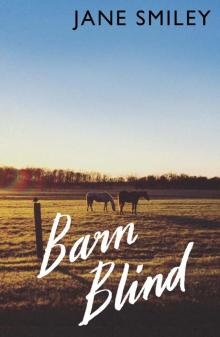 Barn Blind
Barn Blind A Thousand Acres (1992 Pulitzer Prize)
A Thousand Acres (1992 Pulitzer Prize)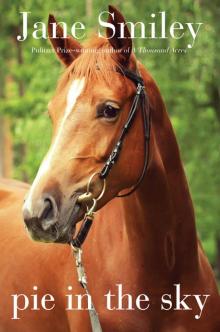 Pie in the Sky
Pie in the Sky True Blue
True Blue A Thousand Acres_A Novel
A Thousand Acres_A Novel A Good Horse
A Good Horse